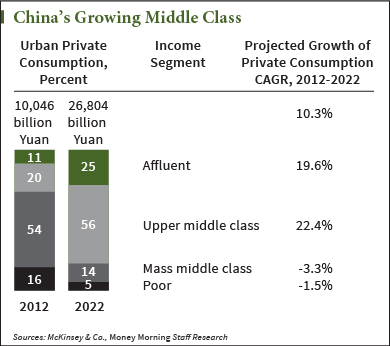There's a fundamental shift happening in China's economy. It's giving investors an incredible opportunity to profit with this small-cap ETF...
 In the last decade, China's economic growth came from capital spending. This benefitted the large state-owned enterprises (SOES). But the Chinese economy is changing focus.
In the last decade, China's economic growth came from capital spending. This benefitted the large state-owned enterprises (SOES). But the Chinese economy is changing focus.
It's moving toward a consumption-driven model. It's trying to become free market-friendly. And the traditional large-cap investments are no longer providing the most compelling growth story.
This is not to say these SOES should be avoided. The largest and most liquid China ETF is the iShares China Large-Cap ETF (NYSE Arca: FXI). And for investors looking to dip their toes into emerging markets, it's perhaps the safest way to play China.
The allure of these companies is the patronage it receives from the Chinese government.
"These mega-cap state-run companies have benefited from political and financial support from the government, their significant economies of scale, favorable regulations, and oligopolistic positions in their respective industries," wrote Morningstar analyst Patricia Oey.
But a move from the capital spending model is going to challenge the oligopolistic position of these large, Chinese government beneficiaries. Investors looking to make the most of China will want to look toward the growing middle class.
"This is a numbers game," said Money Morning Chief Investment Strategist Keith Fitz-Gerald. "With 1.3 billion consumers who want to live like we in the U.S. do, the path is clear to higher profits."
There are 600 million people in China's middle class. And that figure is expected to grow by 25 million a year, according to Ernst & Young. According to McKinsey & Co., China's middle class - wage earners making between $9,000 and $34,000 a year - has grown from 4% in 2000 to 68% in 2012. McKinsey projects that will grow to 75% by 2022.
This outgrowth of Chinese spenders is going to turn the traditional model on its head.
No longer will it be the large enterprises carrying the torch in the so-called "Chinese economic miracle."
Instead, it will be the wage earners seeking a higher standard of living. And the best Chinese stocks to buy will be the companies tapping this growth market.
That's where this small-cap ETF comes in...
A Chinese Small-Cap ETF Play on the Country's Middle Class
The Guggenheim China Small Cap ETF (NYSE Arca: HAO) has two distinct advantages over the traditional Chinese investment vehicles like FXI. This exchange-traded fund seeks to replicate the performance of the AlphaShares China Small Cap Index.
The Chinese consumer is going to move a lot of money across HAO's 303 small-cap holdings, as they seek higher standards of living.
"We're talking about a $3 trillion domestic Chinese market and growing by 7% or more a year," Fitz-Gerald said.
Its largest sector holdings are in industrials at 21.2%. Other sector holdings include technology (14.8%), consumer cyclicals (13.1%), basic materials (13%), and real estate (12.2%), according to Morningstar.
Its second advantage is that, simply put, it won't be at the mercy of government patronage like the SOES.
"Small-caps are tied almost directly to consumers," Fitz-Gerald said. "They will closely track the rise of the middle class with the least amount of interference."
Now, small-cap investing doesn't come without concerns of volatility. Price swings are more dramatic in smaller companies when money floods into these thinly traded markets. This will provide outsized gains on the upside, but there's also potential for a violent freefall on the downside when sell-offs do happen.
[epom key="ddec3ef33420ef7c9964a4695c349764" redirect="" sourceid="" imported="false"]
This may tempt investors to stick with the safer, steadier large-cap China ETFs. But that would unnecessarily lock you out from the real profit potential that's starting to emerge.
HAO is diversified enough that no one holding makes up more than 1.3% of the portfolio. This should allay some volatility. But even so, there's more to support explosiveness on the upside than downside for HAO.
Fitz-Gerald said he believes Chinese small-cap stocks are trading 30% below fair value.
And HAO has a relatively low price-to-earnings ratio of 10. This compares to the S&P average of 19.1. The average price to book and price to sales ratios are 0.91 and 0.7. If HAO is going to move dramatically at all, it's going to be up.
"By Western metrics, it's a very cheap investment right now," Fitz-Gerald said. "You'll be getting good value for your money too. I always like that."
The Bottom Line: Investors need to try to sound out their misgivings in the Red Dragon and at least allocate some capital to it.
"If you're refusing to invest in China out of principle or ignorance, you're unnecessarily restricting your profit potential," Fitz-Gerald said.
FXI is a good play for the risk-averse China investor. But if you want to profit from the real growth story- China's middle class - you'll want to place your bets small-cap ETF like HAO.
China Is Buying Gold in Secret... So says Jim Rickards, Financial Threat and Asymmetric Warfare Advisor for both the Pentagon and the CIA. We don't know exactly how much gold China has, but we do know one thing: it is accumulating more. And if China accumulates enough gold, it could replace the U.S. dollar as the world reserve currency...


